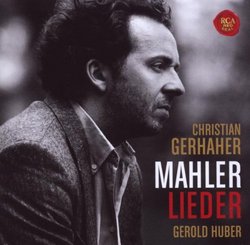| All Artists: Christian Gerhaher Title: Mahler: Lieder Members Wishing: 0 Total Copies: 0 Label: Sony Classics Original Release Date: 1/1/2009 Re-Release Date: 11/17/2009 Genre: Classical Styles: Historical Periods, Classical (c.1770-1830) Number of Discs: 1 SwapaCD Credits: 1 UPC: 886975677320 |
Search - Christian Gerhaher :: Mahler: Lieder
 | Christian Gerhaher Mahler: Lieder Genre: Classical
|
Larger Image |
CD DetailsSimilar CDs |
CD ReviewsChacun a son gout... another knockout performance from a sup John A. Santoro | CT | 12/31/2009 (5 out of 5 stars) "Chacun a son gout... At the close of Santa Fe listener's appreciative but ultimately disparaging review, he queries, "Is this really the best that the new generation can do?" As a singer and musician myself, I feel very strongly that if these deeply emotional, imaginatively detailed performances are not the best ANY generation has done, then they certainly rank on a par with the greatest Mahler recordings of the past and present, among which I would number those of Ludwig, Berry, Fischer-Dieskau, and Quasthoff. In fact, I take issue with almost all of Santa Fe's points, from his disaffection for Mahler's masterfully evocative piano accompaniments to his characterizations of Gerhaher's and Huber's technical and interpretive choices. Make no mistake about it: we all hear with different ears, and no auditor can presume to absolute objectivity, understanding, or infallibility. That being said, my ears hear in Herr Gerhaher's singing (no less here than in his astonishing recordings of the three Schubert cycles) an EXCEPTIONALLY beautiful, charming, and, yes, distinctive voice, allied to a musical integrity and artistic sensibility of the very highest order. Indeed, in Schubert in particular, I would proclaim him one of the dozen or so finest lieder interpreters on record." Accomplished singing that doesn't quite capture Mahler's com Santa Fe Listener | Santa Fe, NM USA | 11/17/2009 (4 out of 5 stars) "It's become fairly customary for singers with an inclination toward lieder to make a Mahler record, so we are no longer in short supply. Gerhaher's most recent competition comes from Christianne Stotijn and Dietrich Henschel, but one must keep in mind Thomas Hampson's older recitals on Teldec and EMI. The composer left such masterful orchestral arrangements of his songs that using a piano sounds a little skimpy. Still, Gerhaher is a musical singer and much in demand. I've liked his earlier recitals without rating them near the top. by comparison, he's clearly grown as an artist, and each of these songs calls forth a genuine interpretation. Unlike Hampson or Fischer-Dieskau, Gerhaher's timbre isn't distinctive; in fact, it's generic. His accompanist, Gerold Hubr, offers more than background. He, too, has musical ideas, although in the first song, Rheinlegendechen, Huber starts out with a slow, almost mannered delicacy, only to have Gerhaher enter in a more direct, unmannered style. As far as the program goes, the centerpieces are the Lieder eines fahrenden Gesellen and the Ruckert Lieder, the rest being filled out with a scattering of songs from the Knaben Wunderhorn collection and the early songs. There's no doubt that Gerhaher is a solid vocalist, and he has command over the melodic line. What's somewhat lacking is two things: charm and intensity. In the best Mahler singing, as from Thomas Quasthoff, we are brought into a magical sound world full of irony and wit, pathos and sentimentality, the whole package unified by deep emotional commitment. With Gerhaher we get something less -- sensitivity and emotional balance, with no emotion carried to extremes. Things could be worse, yet with so many rivals who offer more -- especially great female singers like Christa Ludwig and Janet Baker -- I found this CD a bit dispiriting. Is this really the best that the new generation can do?" Astonishing beauty Bernard in San Francisco | 03/23/2010 (5 out of 5 stars) "You could pick these performances apart phrase by phrase, note by note, and you'd see how the magic is achieved. I think that, in this forum, for my purpose, detailed analysis is not what's called for. I'm not enjoying writing this. But I think the beauty and expressive power of these performances makes them so important that I must force myself.
Gerhaher has and gives everything: sweetness, metal - he even croons on occasion. He highlights and colors text by leaning on some words, glancing off others. Pianist Gerold Huber's instrument simultaneously gleams and sings. He makes the orchestral accompaniments superfluous. Gerhaher and Huber both give shape and contour to melody and clarity to texture. Their partnership is that of artists perfectly aligned toward expressing the poets, the composer, themselves, and, by extension, the listener. They remind me that I listen to this music because it has the power to mirror the content of my own heart. I've been listening to this music for thirty years. Fischer-Dieskau's live recordings of the Lieder eines fahrenden Gesellen with Furtwangler in Salzburg and with Leonard Bernstein's piano accompaniment are particular favorites. Among the younger generation I love Konrad Jarnott and Christopher Maltman. But I don't believe in "best" recordings. Great works can be superbly interpreted in many ways. I think a test -- if you really must apply a test -- of the validity of particular interpretations is how inevitable they sound when you're listening to them. When I listen to these, there are no others. " |

 Track Listings (20) - Disc #1
Track Listings (20) - Disc #1
